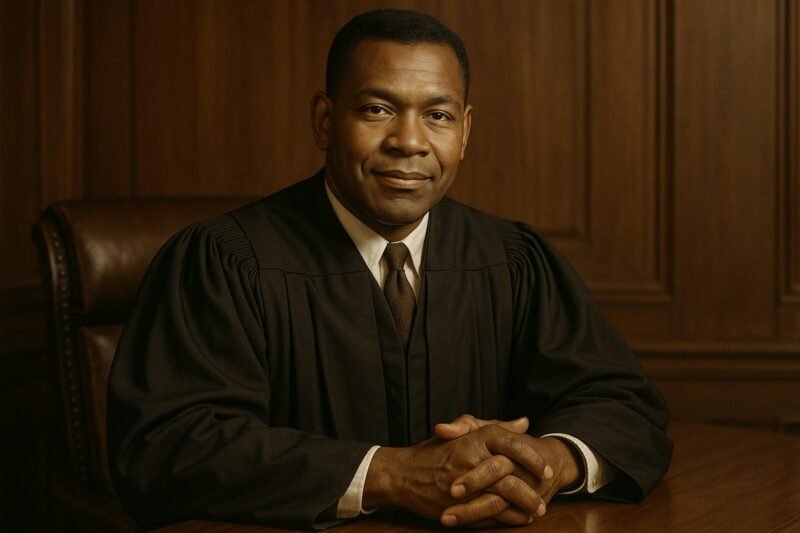Early Life and New Orleans Roots
Born on February 19, 1920, Richard Dunbar Gumbel entered the world in New Orleans, Louisiana, a city known for its vibrant culture and complex history. His family carried a remarkable heritage that included Creole, African American, and German-Jewish roots.
Richard was the son of Richard Dunbar Gumbel Sr. and Marie Lucretia Soule. The Gumbel family name itself traces back to ancient Germanic origins, meaning “battle” and “bold.” Growing up in Louisiana during the early 20th century, Richard experienced a world that would profoundly shape who he would become.
Journey to the Bench
The family eventually made the significant move from New Orleans to Chicago, seeking greater opportunities in the North. This relocation proved transformative for Richard and his siblings.
Richard dedicated himself to his education and pursued a career in law. His path to the judiciary wasn’t easy, especially for a Black man in the 1940s and 1950s. Yet he persevered, eventually earning the title of Honorable Judge.
Serving Cook County as Probate Judge
Richard Dunbar Gumbel made his mark as a probate court judge in Cook County, Illinois. During the 1960s, he presided over cases involving estates, wills, and guardianships with fairness and dignity.
His colleagues knew him as a man of integrity who took his responsibilities seriously. Working within Chicago’s complex judicial system, he earned respect from attorneys and families alike. His presence on the bench represented progress during a time when African Americans were still fighting for equal representation in professional fields.
Building a Family in Hyde Park
Richard married Rhea Alice LeCesne on January 9, 1945, in New Orleans. Their union would last until his death and produce four children who would carry forward his values.
The couple raised their family in Hyde Park, a diverse Chicago neighborhood known for its intellectual atmosphere and proximity to the University of Chicago. Greg was born in 1946, followed by Bryant in 1948, and their two daughters, Rhonda and Renee. The children attended St. Thomas the Apostle Grammar School and were raised in the Catholic faith, with the boys even serving as altar boys.
A Father Who Led by Example
Judge Gumbel believed deeply in education and cultural exposure. He didn’t just tell his children what to do—he showed them through his own actions.
Weekend trips to the Field Museum of Natural History, the Shedd Aquarium, and the Museum of Science and Industry became family traditions. These weren’t just outings; they were lessons in curiosity and learning. Richard also took his sons to baseball games at Comiskey Park and Wrigley Field, fostering their love of sports.
He stressed the importance of speaking well and thinking clearly. His children learned to articulate their thoughts, a skill that would prove invaluable in their future careers. Richard taught through suggestion rather than force, guiding his children toward excellence without pushing too hard.
The Rise of the Gumbel Brothers
Greg Gumbel went on to become one of television’s most respected sportscasters. He made history in 2001 as the first African American to call play-by-play for a Super Bowl. His smooth, understated style became his trademark.
Bryant Gumbel broke barriers as the first Black co-host of NBC’s “Today Show,” a position he held for 15 years. He later hosted HBO’s “Real Sports,” earning numerous Emmy Awards and a Peabody Award.
Both brothers have acknowledged their father’s influence countless times. They’ve said their greatest regret was that he died before seeing them achieve success in broadcasting. The values he instilled—hard work, education, and integrity—became the foundation of their careers.
A Life Cut Short
In April 1972, tragedy struck when Richard Dunbar Gumbel suffered a heart attack outside his court chambers. He was only 52 years old.
His death came at a time when his children were just beginning their adult lives. Greg was 25 and working in hospital supply sales. Bryant was finishing college. The loss devastated the family.
Richard was buried at Holy Sepulchre Cemetery in Alsip, Illinois. His funeral was attended by colleagues from the legal community, friends from Hyde Park, and family members who had traveled from Louisiana. The man who had quietly broken barriers and raised a remarkable family was gone too soon.
A Legacy That Endures
Richard Dunbar Gumbel’s story represents an important chapter in African American history. As a Black judge in Chicago during the 1960s, he served with distinction during the height of the Civil Rights Movement.
His Creole heritage connected him to Louisiana’s unique cultural history, where French, Spanish, African, and Native American influences blended together. The Gumbel family’s journey from New Orleans to Chicago mirrors the Great Migration, when millions of Black Americans moved north seeking better lives.
Today, Richard’s legacy lives on through his children and grandchildren. His emphasis on education, cultural awareness, and personal excellence created a ripple effect that extended far beyond his own lifetime. While he may not have lived to see his sons become household names, his influence is evident in everything they accomplished.









